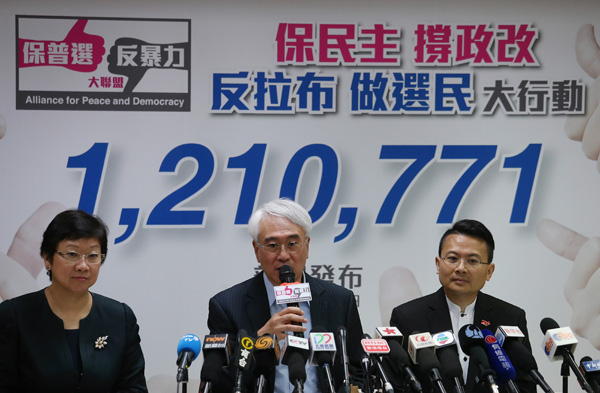HK 'democrats' go against mainstream opinion
Updated: 2015-06-10 07:47
By Zhang Dinghuai(China Daily)
|
||||||||
 |
|
Robert Chow Yung (second from left), spokesman for the Alliance for Peace and Democracy, meets the media with fellow members at a news conference in Hong Kong on Monday. The alliance has received more than 1.2 million signatures from Hong Kong residents in its campaign to support the government's electoral reform package. Roy Liu / China Daily |
Democratic politics should follow mainstream opinion, and any political leader or organization that ignores mainstream opinion is doomed to failure.
Democratic politics cannot be isolated from political rules, because only when political rules are widely recognized and accepted can democratic politics work. Democratic politics will end in disaster if it goes against political rules, a fact that has been proved time and again.
Of the two parts of political rules for Hong Kong, one is determined by the city's constitutional status, which involves the basic rules for the political relationship between the central government and the Hong Kong Special Administrative Region, and the other is concerned with legal rules, including the Basic Law of the SAR and decisions made by the Standing Committee of the National People's Congress, the top legislature body, under the framework of the Basic Law.
But the pan-democracy camp in Hong Kong seems to ignore the two basic elements of democratic politics on the issue of electing the SAR's chief executive (CE) through universal suffrage.
On Aug 31, 2014, the NPC Standing Committee took a decision on the Hong Kong CE's election according to the actual situation in the SAR and the relevant regulations of the Basic Law. But the pan-democracy camp refused to accept it.
In doing so, the so-called camp has challenged the central government's authority and questioned the sanctity of the relationship between the central government and Hong Kong. Also, the pan-democracy camp has stuck to its demand that parties and individuals have the right to nominate candidates for the CE's post even though it violates Article 45 of the Basic Law. And despite the central government strictly adhering to the Basic Law in carrying out constitutional reform in Hong Kong, the so-called democrats organized the "Occupy Central" campaign to confront the central government.
The pan-democracy camp as well as pro-establishment group have conducted opinion surveys. Each political group should follow the change in public opinion on constitutional reforms and make adjustments accordingly.
The mainstream social opinion in Hong Kong today is more inclined toward promoting constitutional reform. The signature campaign for universal suffrage carried out by the Alliance for Peace and Democracy and other group's opinion surveys show that more than 60 percent Hong Kong residents support the central government's constitutional reform plan for the SAR. Considering the "silent majority" in Hong Kong, we can conclude that the mainstream opinion in the city supports constitutional reform as prescribed by the central government.
Despite the clear public support and political rules for Hong Kong's constitutional reform, the pan-democracy camp rejected the constitutional reform plan in the SAR Legislative Council's vote. This goes against the mainstream opinion and breaks the basic rules for the development of democracy in Hong Kong.
The pan-democracy camp has always viewed the central government's plans for Hong Kong's democratic reform with suspicion. It doubts the central government's determination and sincerity in carrying out democratic reform. But why would the central government advance two objectives of universal suffrage in the Basic Law if it didn't want to carry out democratic reforms in Hong Kong?
Hong Kong's constitutional reform in this round involves the city's future vital interests and the NPC Standing Committee's Aug 31 decision has taken that into consideration.
Given that a majority of Hong Kong residents support the central government advocated constitutional reform, the pan-democracy camp's rejection of the plan goes against mainstream public opinion and political rules. The pan-democracy camp is trying to deprive the about 5 million Hong Kong residents who are eligible to vote in favor of the policies they support, which is tantamount to depriving them of their right to choose between good and bad.
The author is a professor at Shenzhen University and a member of the Chinese Association of Hong Kong and Macao Studies.
- Global health entering new era: WHO chief
- Brazil's planning minister steps aside after recordings revelation
- Vietnam, US adopt joint statement on advancing comprehensive partnership
- European border closures 'inhumane': UN refugee agency
- Japan's foreign minister calls A-bombings extremely regrettable
- Fukushima impact unprecedented for oceans: US expert

 Stars of Lijiang River: Elderly brothers with white beards
Stars of Lijiang River: Elderly brothers with white beards
 Wealthy Chinese children paying money to learn British manners
Wealthy Chinese children paying money to learn British manners
 Military-style wedding: Fighter jets, grooms in dashing uniforms
Military-style wedding: Fighter jets, grooms in dashing uniforms
 Striking photos around the world: May 16 - May 22
Striking photos around the world: May 16 - May 22
 Robots help elderly in nursing home in east China
Robots help elderly in nursing home in east China
 Hanging in the air: Chongqing holds rescue drill
Hanging in the air: Chongqing holds rescue drill
 2.1-ton tofu finishes in two hours in central China
2.1-ton tofu finishes in two hours in central China
 Six things you may not know about Grain Buds
Six things you may not know about Grain Buds
Most Viewed
Editor's Picks

|

|

|

|

|

|
Today's Top News
Liang avoids jail in shooting death
China's finance minister addresses ratings downgrade
Duke alumni visit Chinese Embassy
Marriott unlikely to top Anbang offer for Starwood: Observers
Chinese biopharma debuts on Nasdaq
What ends Jeb Bush's White House hopes
Investigation for Nicolas's campaign
Will US-ASEAN meeting be good for region?
US Weekly

|

|









